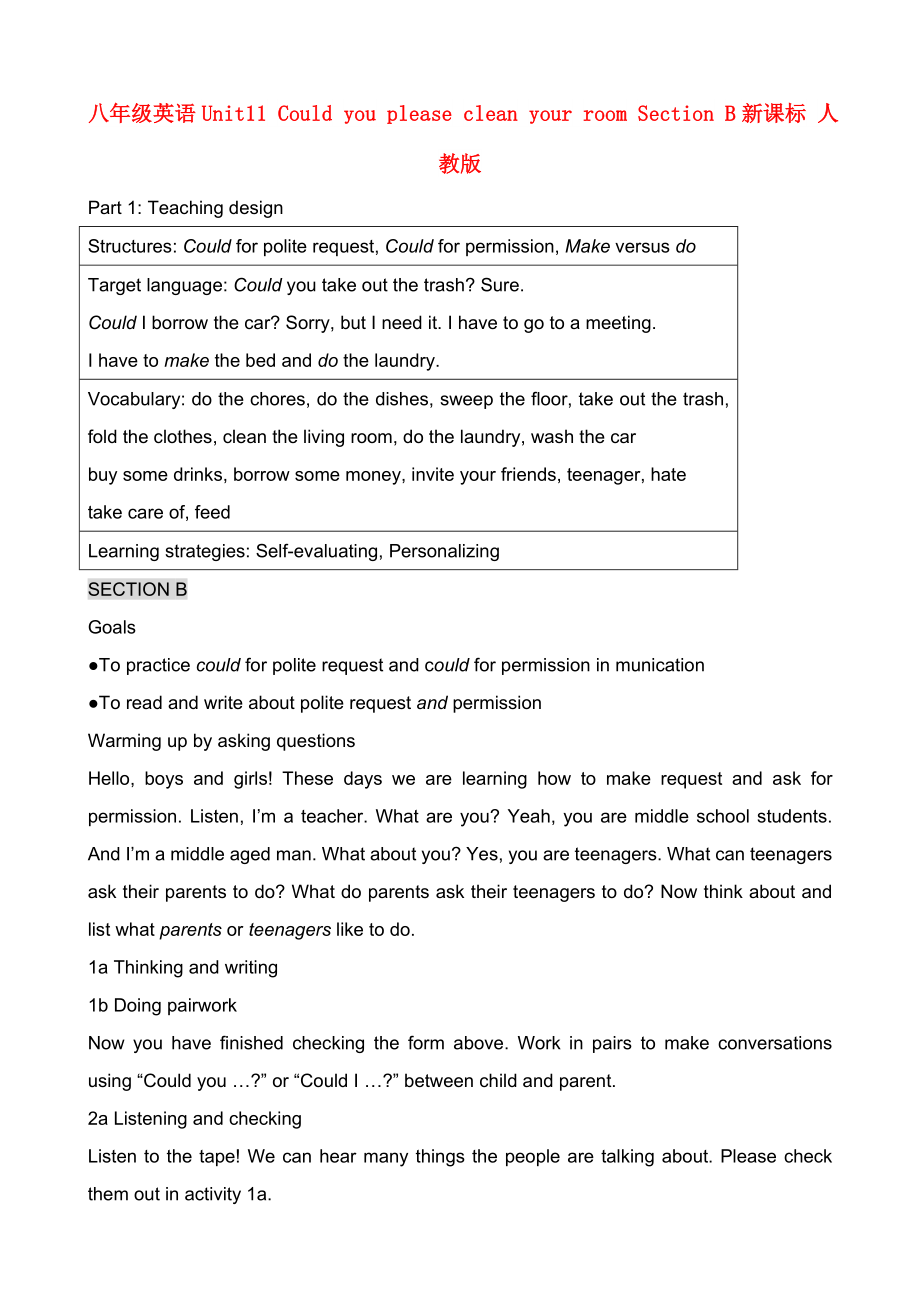《八年級(jí)英語(yǔ)Unit11 Could you please clean your room Section B新課標(biāo) 人教版》由會(huì)員分享����,可在線閱讀,更多相關(guān)《八年級(jí)英語(yǔ)Unit11 Could you please clean your room Section B新課標(biāo) 人教版(3頁(yè)珍藏版)》請(qǐng)?jiān)谘b配圖網(wǎng)上搜索���。
1��、八年級(jí)英語(yǔ)Unit11 Could you please clean your room Section B新課標(biāo) 人教版
Part 1: Teaching design
Structures: Could for polite request, Could for permission, Make versus do
Target language: Could you take out the trash? Sure.
Could I borrow the car? Sorry, but I need it. I have to go to a meeting.
I have
2�、to make the bed and do the laundry.
Vocabulary: do the chores, do the dishes, sweep the floor, take out the trash, fold the clothes, clean the living room, do the laundry, wash the car
buy some drinks, borrow some money, invite your friends, teenager, hate
take care of, feed
Learning strategies:
3�����、 Self-evaluating, Personalizing
SECTION B
Goals
●To practice could for polite request and could for permission in munication
●To read and write about polite request and permission
Warming up by asking questions
Hello, boys and girls! These days we are learning how to make request and ask for p
4�、ermission. Listen, I’m a teacher. What are you? Yeah, you are middle school students. And I’m a middle aged man. What about you? Yes, you are teenagers. What can teenagers ask their parents to do? What do parents ask their teenagers to do? Now think about and list what parents or teenagers like to d
5、o.
1a Thinking and writing
1b Doing pairwork
Now you have finished checking the form above. Work in pairs to make conversations using “Could you …?” or “Could I …?” between child and parent.
2a Listening and checking
Listen to the tape! We can hear many things the people are talking about. Plea
6���、se check them out in activity 1a.
Let’s check the answers!
Answers
The following items should be checked:
1 2 3 4 5 6
Now it’s time to read the tapescript and try to underline the expressions to be copied and blacken the modal verb could and can.
2b Listening and writing
From the li
7��、stening material we know that the conversation is between Sandy and her mom. Look at the chart. Please write down the things that Sandy’s mom is going to do, that sandy is going to do and that Sandy and Dave are going to do.
2c Doing pairwork
In the listening material, we know Sandy is going to ha
8����、ve a party. She is going to ask her friend to help her. Suppose you are going to have a party. And you are asking your partner to help you. In pairs make conversations making request and asking for permission.
A: Could you take out the trash.
B: Yes, sure.
A: Could you buy me some gifts for my f
9�、riends?
B: Yes, sure.
A: Could you do the cooking for me?
B: Yes, sure.
A: Could you do the cooking for me?
B: Yes, sure.
…
3a Reading and prehending
Do you usually write e-mails? Here is an email from Thomas to Nancy. First read to the recording and pay attention to the pronunciation and in
10、tonation.
Now start reading the e-mail, underlining the expressions at the same time.
Look at the chart on the right. There are three kinds of things in the e-mail. Please fill in the blanks.
3b Writing an e-mail
Sandy wants Dave to help her with her party. Imagine you are Sandy. You want to w
11��、rite an e-mail to your friend Dave. Here is an unfinished e-mail, read it and please plete it.
Read the finished e-mail, darken the modal verb could and copy all the expressions into your Expression Book.
3c Writing about yourself
Hi, kid. Where do you live? Datong? OK, you are going to move to a
12����、 new house. What things do you want to do? Make a list and ask your friend to help you.
Things you want to do: move the TV set, pack the clothes, buy some drinks and snacks, carry the big bags and clean the new house
Now please write an email to your friend for help.
4 Doing groupwork
Work in groups of three. A, B and C are going to ask and answer like this:
Closing down by listing “do phrases”
There are many phrases with do in English. Now try to list as many as possible.
 八年級(jí)英語(yǔ)Unit11 Could you please clean your room Section B新課標(biāo) 人教版
八年級(jí)英語(yǔ)Unit11 Could you please clean your room Section B新課標(biāo) 人教版

